International Journalism and Communication Deans’ Conference Successfully Held
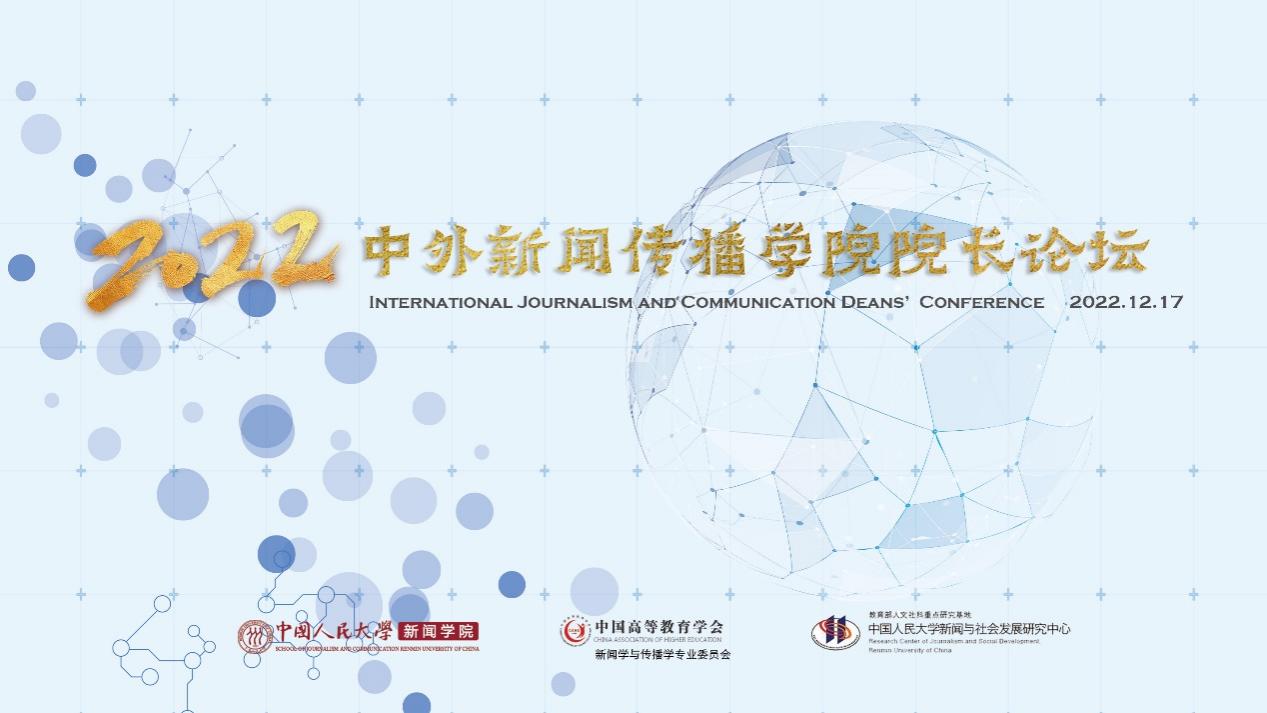
The International Journalism and Communication Deans’ Conference was jointly held on Dec. 17th 2022 by School of Journalism and Communication of RUC, China Association of Higher Education and Research Center of Journalism and Social Development of RUC.
This forum is themed at “Inheritance and Innovation: International Journalism and Communication in the Context of Civilization Diversity”. Over a hundred Deans of schools of journalism and communication and chief editors of academic journals from both home and abroad attended the meeting. They delivered keynote speeches on topics like “The New Form of Human Civilization and Innovative Disciplinary Development of Journalism and Communication”, “Creating International Communication Theoretical System Through Mutual Learning”, and “Top-notch Talent Cultivation for Chinese Modernization”,hared their views at different units of the main forum.
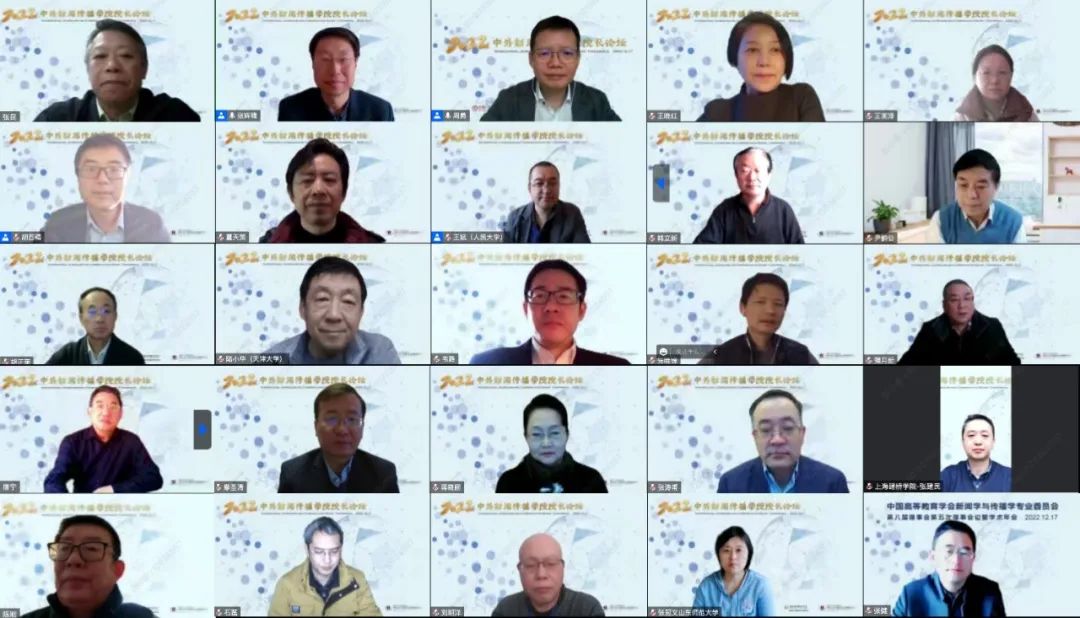
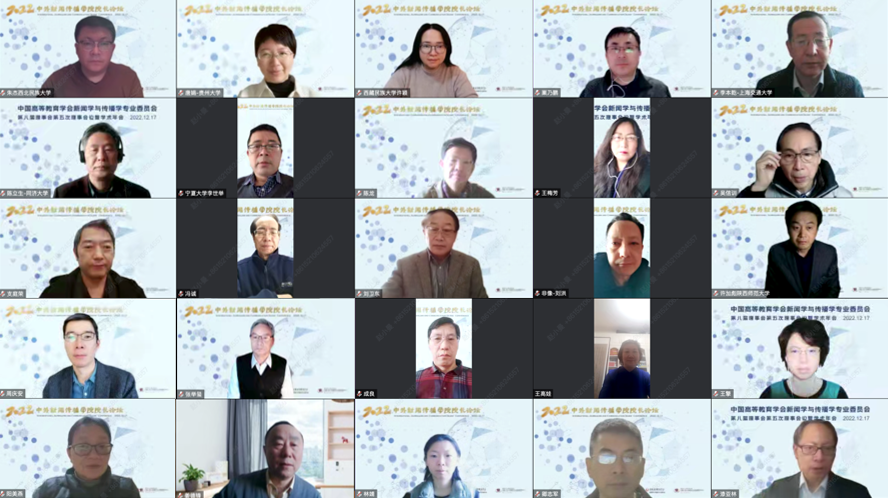
Hu Baijing, Vice President of RUC, attended the opening ceremony and welcomed all participants in his keynote speech. He pointed out that the key to discussing the issue of international communication in the context of cultural diversity is to respect the diversity of civilization and communicate. The academia of journalism and communication should rethink, return and revitalize a new global humanism as promoting the construction of a new form of human civilization.
Zhou Yong, Dean of School of Journalism and Communication, RUC, pointed out in his speech that the discipline of journalism and communication is always closely related to the fate of national social development. The Chinese path to modernization has put forward new requirements for the discipline of journalism and communication: to create a good external environment for national development and enhance international discourse power by telling Chinese stories.
The theme of the main forum is “Innovation of Journalism and Communication Discipline for Chinese Modernization”, which is divided into four units, and more than 40 deans delivered keynote speeches.
Main Forum Unit 1
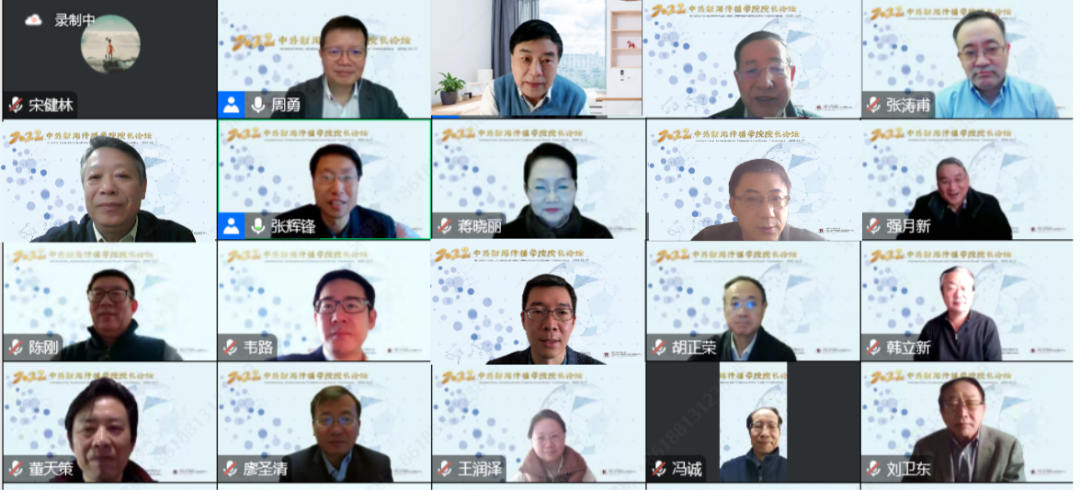
Yin Yungong, Dean of the School of Journalism and Communication of Hunan Normal University, took the transformation of German modernization as a case, which has certain enlightenment significance for the development of Chinese modernization.
Hu Zhengrong, Dean of the School of Journalism and Communication of the University of Chinese Academy of Social Sciences, discussed the research issues raised by Chinese modernization to the discipline of journalism and communication.
Zhang Taofu, Dean of Fudan University School of Journalism, said that with the acceleration of world reconstruction and the reshaping of the world communication pattern, communication has been pushed to the front of the world. Journalism and communication need to promote system upgrading from several aspects to fit in new world trends.
Sui Yan, Dean of School of Journalism, Communication University of China, put forward that to promote the innovation of journalism and communication discipline in the perspective of Chinese modernization, we should stand validly to serve the national strategy as well as having a global vision.
Jiang Xiaoli, Dean of Penguin New Media College of Sichuan University, said that the reform of journalism and communication discipline should promote the multi-dimensional integration of international communication in the new era, including the integration of new technologies to complete the reconstruction of the communication pattern, the use of global issues to maintain common concerns, and the use of cultural mutual learning to create new forms of civilization.
Zhang Kun, the Special Dean of the School of Journalism and Communication of Minzu University of China, believed that the innovation of journalism and communication needs to be carried out in the three directions and give priority to the leading role of the team to establishing a comprehensive system and mechanism.
QiangYuexin, Dean of School of Journalism and Communication, Wuhan University, believed that it is necessary to inject new connotation into specialization on the premise of following the basic functions of news language. To comply with modern Chinese norms, we should uphold the differentiation strategy and deeply integrate with the dissemination of new technologies.
Li Benqian, Dean of the School of Media and Communication, Shanghai Jiao Tong University, believed that to promote the modernization of the discipline construction of journalism and communication with Chinese characteristics, we must adhere to the guiding ideology of Marxism and the leadership of the Party, combine Marxism with China’s excellent traditional culture, and keep pace with the times in theory.
Chen Gang, Dean of the School of Journalism and Communication of Peking University, believed that " Chinese modernization " is a concept that is constantly being explored, revised and improved. The discipline of journalism and communication should work as a think tank to serve the national development strategy of Chinese modernization through theoretical innovation.
According to Zhou Qing’an, Dean of School of Journalism and Communication, Tsinghua University, guided by the idea “Chinese modernization as a self-awareness”, keywords of the discipline construction of journalism and communication are “Chinese path”, “digitization” and “autonomy”; the keywords of talent training system are “high-leveled”, “practical” and “professional”. To resonate with Chinese modernization, the studies of journalism and communication should be advanced in thinking, hold on to professionalism, build dissipation, be self-consistent in knowledge and resist regression.
Mark J. Lodato, Dean of the Newhouse School at Syracuse University, introduced its training model. As one of the top communication schools in the U.S. and the world, the Newhouse School works with industry to cultivate innovative and forward-thinking students, with a curriculum that fosters critical thinking and adaptability.
May O. Lwin, Dean of Wee Kim Wee School of Journalism and Communication at Nanyang Technological University, said that through innovative teaching methods and a sound interdisciplinary curriculum, interdisciplinary education can organize isolated disciplines to produce well-trained communication professionals and citizens with a global perspective.
Main Forum Unit 2
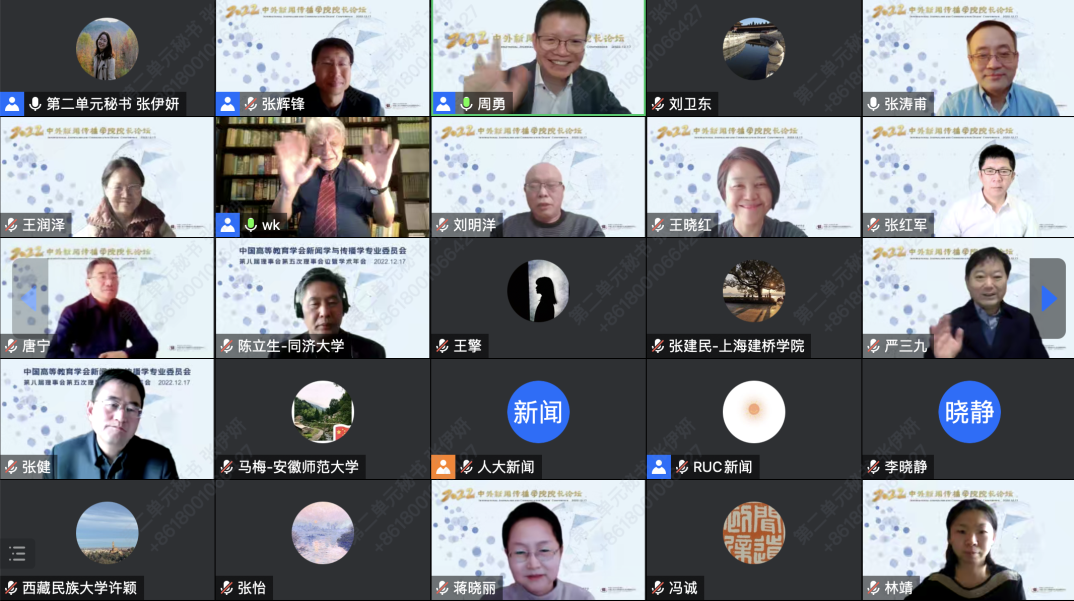
Wang Xiaohong, Dean of the Undergraduate School, Communication University of China, focused on audiovisual communication and shared her views on how to build an autonomous knowledge system for Chinese modernization. She expressed the importance of promoting theoretical innovation based on practice, repositioning value of the discipline of audiovisual communication, and treasuring its possibilities and great potential in constructing an autonomous knowledge system in the future.
Wei Lu, Dean of School of Media and International Culture, Zhejiang University, proposed to iterate the upgrade of the discipline from three aspects: disciplinary system, professional system, and curriculum system. It is suggested that tutors further rationalize the pattern and structure of the discipline, so that professional system and disciplinary system can be better matched; they should also “clarify the direction, strengthen the foundation, emphasize practice, and improve quality” to truly build a curriculum system centered on students’ growth.
Zhang Hongjun, Executive Dean of the School of Journalism and Communication, Nanjing University, believed that in order to achieve innovative development, the discipline of journalism and communication must understand the macro requirements, meso choices, and micro paths implied by the current context, including solving the problem of the discipline’s positioning at the macro level, adjusting its strategic direction at the meso level, and determining its development path at the micro level.
Dong Tiance, Dean of School of Journalism,Chongqing University, emphasized the importance of human’s modernization in creating a new form of human civilization, the significance of simultaneous progression of multiple paradigms, and called for the integration of scientific pursuit and value pursuit, instrumental rationality and value rationality, and humanism and scientific spirit.
ZhiTingrong, Dean of the School of Journalism and Communication, Jinan University, believed that in order to innovate the discipline for Chinese modernization, scholars should deal with the relationships between “breaking” and “establishing”, “broad” and “narrow”, “high” and “low”; the academic discourse and traps should be broken down, and our own academic system and knowledge system should be established; the coverage of the discipline should be expanded to face the continuous development of new technologies.
Zhang Mingxin, Dean of School of Journalism and Information Communication, Huazhong University of Science and Technology, said that mutual appreciation of civilizations is the fundamental concept and methodology of international communication, and shared the connotation of mutual appreciation of civilizations from four aspects, among which equality and respect are the prerequisite foundation, openness and tolerance are the essential requirements, dialogue and communication are the fundamental ways, and innovation and development are the internal motivation.
Liu Mingyang, Dean of School of Journalism and Communication, Shandong University, shared the “value”, “culture”, and “path” of disciplinary innovation, and said that scholars should “coordinate developments of ‘the points’ and ‘the surfaces’”, forming a consensus between individual creation issues and systematic construction, and combining independent and shared innovation.
Yan Sanjiu, Dean of the School of Journalism and Communication, Shanghai University, shared his thoughts on media algorithm in the context of Chinese modernization, suggesting that technology should better contribute to social justice and people’s good life, which is also the right thing to do in the construction of journalism and communication for Chinese modernization.
Elena LeonidovnaVartanova, Dean of School of Journalism, Moscow State University, discussed the relationship between local and global orientation in the context of Russian media system’s revolution, emphasizing the important role of the state in the current context of digitalization and globalization.
Wolfgang Kubin, tenured professor at the University of Bonn, Germany, discussed the relationship between technology and humanities in the context of Marxism and Hegelian philosophy, who started with the translation of the concept of technology and pointed out the risks and pitfalls implicit in the process of technological development.
Main Forum Unit 3
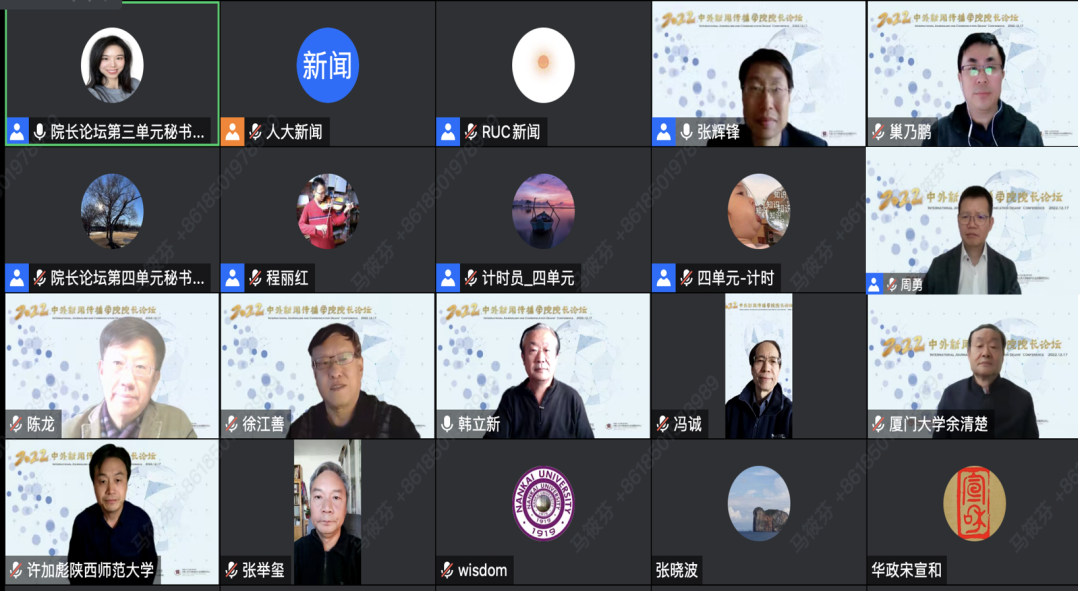
Yu Qingchu, Dean of the School of Journalism and Communication, Xiamen University, believed that the development and innovation of journalism and communication should be considered under the three frameworks of “Chinese, modernized Marxism”, “Chinese modernization”, and “new forms of human civilization”. The most important point for the construction of the discipline of journalism and communication for Chinese modernization is to nurture people for the Party and talents for the country.
Chen Long, Executive Dean of the School of Communication, Soochow University, discussed with the topic of “universal media practice and the adjustment of journalism and communication education” the metamorphosis of journalism and the differentiation and reorganization of journalism and communication professions, the dilemmas of universal media practice and development of the discipline of journalism and communication, and the reorientation and readjustment of the discipline towards the direction of knowledge integration.
Feng Cheng, Dean of the School of Journalism and Communication, Lanzhou University, shared the school’s specific initiatives to adjust and optimize the discipline construction in the new era, new stage, and new background, including condensing the discipline direction for Chinese modernization, optimizing the discipline construction and research level, and insisting on cultivating strategic and compound high-level journalism and communication talents of the new era with the greatness of the country in mind.
Zhang Xiaofeng, Executive Dean of the School of Journalism and Communication, Nanjing Normal University, shared the school’s experience of discipline construction and proposed to enhance the international communication capability with a global perspective, promote the connotation construction, transformation, and characteristic development of the discipline of journalism and communication, and serve the grand strategy of Chinese-style modernization and the great rejuvenation of the Chinese nation.
Zhang Juxi, Dean of the School of Journalism and Communication of Zhengzhou University, shared the “three double mechanisms” education model of the School of Journalism and Communication of Zhengzhou University to solve the problem of mismatch between supply and demand in academics and journalism industry, and to cultivate a large number of excellent journalistic talents with strong political awareness, excellent professional competence and positive attitude in the education practice.
Xu Jiabiao, Dean of the School of Journalism and Communication of Shaanxi Normal University, explored the discourse dilemma in international communication with the topic “Chinese Discourse Innovation in International Communication in the New Era”and proposed that the construction of China’s international communication discourse should go deeper into the level of values and find a breakthrough and foothold for discourse construction with the values of “building a community of human destiny”.
Han Lixin, Dean of the School of Journalism and Communication at Hebei University, shared his views on “Cultivating Critical Competence and Building Knowledge”, arguing that critical competence is needed in the face of uncertainties in the international communication field, suggesting that the “History of Chinese Communist Journalism+” should be used as a resource for cultivating critical competence and putting the teaching of the Marxist concept of journalism into practice.
Chao Naipeng, Dean of the School of Communication at Shenzhen University, believed that in the context of a digital society, the construction of journalism and communication disciplines needs to face up to the micro dilemma of fragmented research and lack of theoretical resources, establish the subjectivity of journalism and communication disciplines, and respond to the macro requirements of social revolution and knowledge innovation.
BülendAydın ERTEKİN, Dean of the Faculty of Information Sciences at the University of Anadolu, believed that journalism should focus on eliminating hostility and fear, building bridges between countries, nations and peoples, and should focus on delivering rational journalistic content and creating a good international image.
Main Forum Unit 4
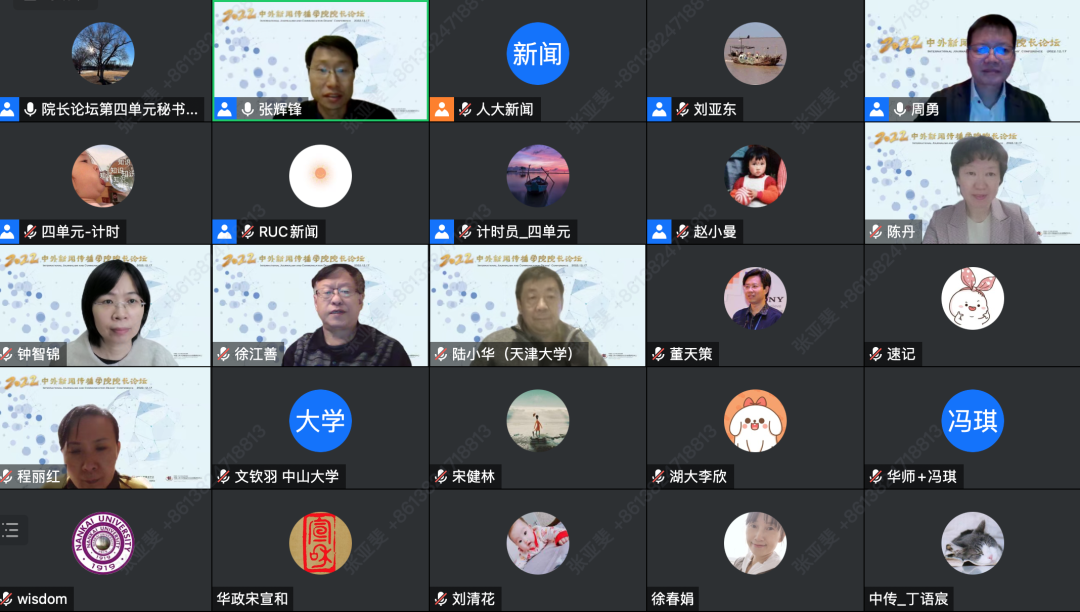
Cheng Lihong, Dean of the School of Journalism and Communication at Liaoning University, pointed out that the conceptual system is the logical starting point for the development of the discipline and the basis for determining the composition of the disciplinary system, and proposed a “triangular relationship” to define the autonomous knowledge system of the Chinese journalism and communication discipline, namely journalism practice, journalism technology and journalism concepts.
Guo Ke, Dean of the School of Journalism and Communication at Shanghai International Studies University, discussed the new trends in international journalism and communication education, arguing that the training of international journalism talents should not only focus on the improvement of foreign language skills, but also on the effective integration with different subject areas, and focus on practice in teaching to cultivate talents who can meet the needs of society.
Lu Xiaohua, Dean of the School of New Media and Communication at Tianjin University, believed that journalism is a supporting discipline of the philosophical and social sciences and plays an important role in the construction of China's autonomous knowledge system, and proposes that journalism and communication face two major propositions - “Chinesization” and “Modernization”.
Zhong Zhijin, Dean of the School of Journalism and Communication of Sun Yat-sen University, cited the participation of students from the School of Journalism and Communication of Sun Yat-sen University in the publicity coverage of the Winter Olympics as an example, suggesting that promoting the training of international communication talents requires combining theory and practice, and making efforts from various aspects such as teachers, teaching materials and practice platforms.
Taking online literature going abroad as an example, Chen Dan, Executive Dean of the School of Journalism and Publishing, Beijing Printing Institute, shared how to tell the Chinese story, spread the Chinese voice and enhance the national image through innovative cultural communication in order to reach the strategic goal of international communication.
Xu Jiangshan, Dean of the School of Journalism and Communication at Heilongjiang University, believed that the reshaping of media literacy is a cultural cornerstone of Chinese-style modernization, which is conducive to the stability of the CPC and the healthy development of the country, and proposes three strategies for reshaping media literacy.
Liu Yadong, Dean of the School of Journalism and Communication at Nankai University, believed that international communication should focus on promoting exchanges and integration among civilizations, and that journalism and communication disciplines and international communication education should focus on clarifying the three questions of “to whom”, “what” and “how”, establishing an ideological line of seeking truth from facts and presenting a three-dimensional and comprehensive China.
Glenda Daniels, Head of the Department of Media Studies at the University of the Golden Mountains in South Africa, provided an analysis and introduction to the norms and dilemmas of journalism from a technical and humanistic perspective, and shares the current state of development of independent journalism in South Africa.
The main forum of The Conference was hosted by Zhou Yong, Dean of the School of Journalism of Renmin University of China, and Zhang Huifeng, Council Chair of the School. On the afternoon of Dec. 17th, five thematic sub-forums named “The development of journalism and communication education for Chinese modernization”, “The New Form of Human Civilization and Innovative Disciplinary Development of Journalism and Communication”, “Development of Journalism and Communication Education for ChineseModernization”, “The Construction of a Multi-ethnic Journalism and Communication Discipline Community for Common Construction and Sharing”, “Academic Standardization and Leading of Independent Knowledge Innovation in Journalism and Communication Discipline” were held in parallel, with invited experts and scholars discussing development and mutual enlightenment. Thousands of teachers and students attended the meeting online or watched the conference live to share the academic feast.
The International Journalism and Communication Deans’ Conference is a featured project of School of Journalism and Communication, RUC, which has been held for six consecutive years. In 2022, General Secretary Xi Jinping pointed out in the report of the 20th CPC National Congress that “the essential requirements of Chinese modernization are: upholding the leadership of the Communist Party of China and socialism with Chinese characteristics, pursuing high-quality development, developing whole-process people’s democracy, enriching the people’s cultural lives, achieving common prosperity for all, promoting harmony between humanity and nature, building a human community with a shared future, and creating a new form of human advancement”. In order to implement the spirit of the 20th CPC National Congress, walk the new path of Chinese modernization, tell the Chinese story, promote exchanges and mutual leaning among diverse civilizations, and improve China’s international communication, and show the new form of human civilization with Chinese modernization, the School of Journalism and Communication of Renmin University of China gathered hundreds of deans of Chinese and foreign journalism and communication schools to hold the Dean’s Conference again, gathering the wisdom of the academia and reasserting the value of dialogue by sharing insights.
Translators: Sadakaiti Yusaiyin; Teng Jinghan; Su Xing
Editors:Yang Yang; Wu Jiankun; Zhou Minhua



